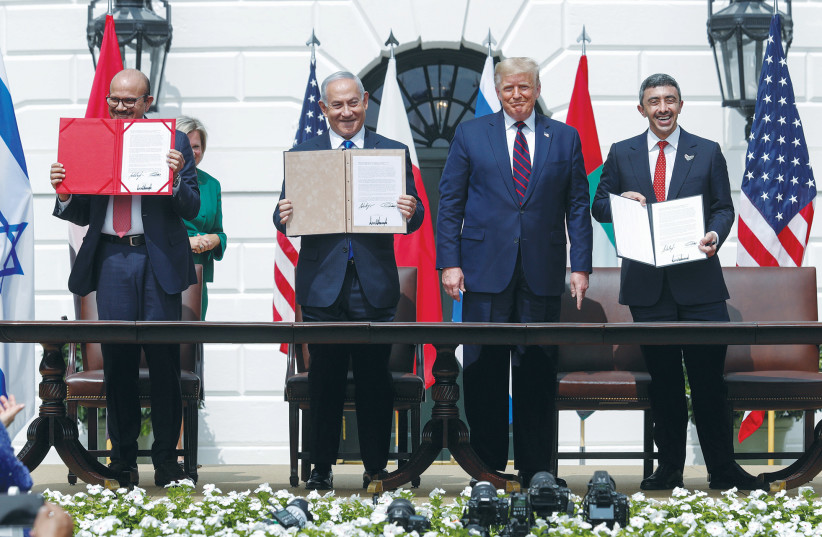The Abraham Accords broke new ground in how the United States engages in the Middle East and how our allies can work together. Indeed, the recent Negev Forum in January exemplified how these historic accords ensured enduring cooperation and the proliferation of regional commonalities. Fortunately, the accords continue to be effective in spite of the Biden administration’s insistence on returning to outdated and regionally destabilizing patterns.
Even in the two years since the agreement was signed, the world and the region transformed dramatically. The return of war to the European continent has raised global tensions and resourced insecurity in an equally dramatic fashion.
At the same time, global energy markets are struggling to pull out of a tailspin caused by widespread supply chain disruption and Russian belligerence. Unfortunately, the Biden administration’s approach to America’s allies and the global energy crisis has been of little help.
US policy in the Middle East over the last two years has been fickle, at best. The Biden administration has consistently ostracized Israel’s new government and the leadership of Saudi Arabia while it has elevated the Palestinian Authority and the Iranian regime at every turn.
However, an unassuming partner – Morocco – could serve as a well-spring of certainty for the future of the accords and cooperation among its signatory nations in these uncertain times. But this will require deliberate action from Morocco and Abraham Accords nations, especially concerning common sovereignty, security and energy needs.

The first step these nations should take is to recognize Morocco’s sovereignty over Western Sahara. This is reportedly Morocco’s condition for opening an embassy in Israel. Taking this action would create the opportunity for greater regional stability and security.
For instance, Israel is a pioneer of desert military operations and improved relations could lead to Israel sharing its expertise and technology to assist Morocco’s territorial governance, not to mention expanding regional counterterrorism efforts on the African continent.
Morocco can also play an important role in pulling energy markets out of a multi-year tailspin. In addition to being viewed as a prized location for renewable energy, Morocco continues to lead the deployment of drought-mitigating desalination plants. However, the real opportunity is in Morocco’s geographic proximity to the economies of sub-Saharan Africa, Europe and the Maghreb.
RECENT NOMINAL progress on the Morocco-Nigeria gas pipeline (NMGP), which links the energy-deprived sub-Saharan African coast, is emblematic of Morocco’s future role when scalable partnerships that are rooted in regional needs and realities are supported on an international level.
Energy poverty is a leading contributor to sub-Saharan Africa’s economic and political woes. By providing affordable and reliable energy and greater regional integration commercial relationships, such as the NMGP, empower international efforts to combat radical Islamist terror cells operating in sub-Saharan Africa or economically devastating mass migration to Europe.
Morocco is a natural partner
Morocco is a natural partner and unique in being culturally and strategically attuned to the importance of relations with Israel, which boasts a significant Moroccan Jewish Diaspora. It sits at the geographic nexus of several threats, from terrorism to China’s economic predation, which continues to spread and peel would-be partners away from the American and European orbits.
Morocco, therefore, has not only unique strengths but also a unique responsibility to help our allies understand and holistically address shared threats. The country should begin by reexamining its relationship with China. As a prime example, a year ago, Morocco became the first North African nation to sign an implementation plan for China’s Belt and Road Initiative.
Furthermore, Morocco continues to elevate the Palestinian cause of statehood despite the lack of accountability for the Palestinian Authority’s decisions to reward terrorist activities. One year after joining the Abraham Accords, Morocco sought to restart negotiations between Israelis and Palestinians, boasting of its “total solidarity with the Palestinian people.”
These are just two milestones Morocco could work on to make its solidarity and alignment with the US and our allies on shared priorities clear even when times are not. By doing so, Morocco can become a key asset in bolstering the Abraham Accords and navigating uncertainty in the region.
Jacob Olidort is a historian of the Middle East who served as an adviser in the office of then-vice president Mike Pence. He is currently the director of the Center for American Security and of the center’s Middle East Peace Project at the America First Policy Institute.
Sam Buchan served on the White House National Economic Council as the director for international economic policy and the senior adviser to secretaries of energy Rick Perry and Dan Brouillette. He is currently the director of the Center for Energy and Environment at the America First Policy Institute.
